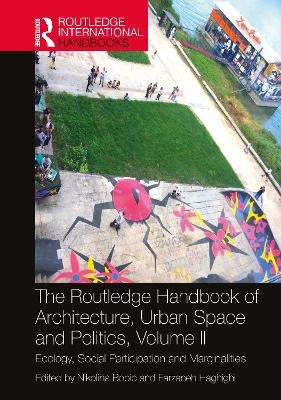
The Routledge Handbook of Architecture, Urban Space and Politics, Volume II
Routledge (Verlag)
978-0-367-62918-2 (ISBN)
Architecture and the urban are connected to challenges around violence, security, race and ideology, spectacle and data. The first volume of this handbook extensively explored these oppressive roles. This second volume illustrates that escaping the corporatized and bureaucratized orders of power, techno-managerial and consumer-oriented capitalist economic models is more urgent and necessary than ever before. Herein lies the political role of architecture and urban space, including the ways through which they can be transformed and alternative political realities constituted. The volume explores the methods and spatial practices required to activate the political dimension and the possibility for alternative practices to operate in the existing oppressive systems while not being swallowed by these structures. Fostering new political consciousness is explored in terms of the following themes: Events and Dissidence; Biopolitics, Ethics and Desire; Climate and Ecology; Urban Commons and Social Participation; Marginalities and Postcolonialism. Volume II embraces engagement across disciplines and offers a wide range of projects and critical analyses across the so-called Global North and South. This multidisciplinary collection of 36 chapters provides the reader with an extensive resource of case studies and ways of thinking for architecture and urban space to become more emancipatory.
Chapter 1 of this book is freely available as a downloadable Open Access PDF at http://www.taylorfrancis.com under a Creative Commons Attribution (CC-BY) 4.0 license.
Dr Nikolina Bobic is an academic and an architect currently based at the University of Plymouth, UK. Her research is preoccupied with political constructs of architecture and urban space. Within this domain, and engaging with the two disciplines in which she is trained (architecture and sociology), she addresses the intersections of power, politics, and space in their oppressive and liberatory mechanisms. Dr Farzaneh Haghighi is a Senior Lecturer in Architecture in the School of Architecture and Planning, the University of Auckland, New Zealand. Her research interests revolve around the political role of space by drawing upon the intersection of political philosophy, architecture and urbanism.
1. Introduction: Ecologies of Resistance and Alternative Spatial Practices Part 1: Events and Dissidence 2. Introduction to Events and Dissidence 3. Concrete, Skateboarding and Building Community: The Battle for Venice Skatepark, Los Angeles 4. Re-Politicizing the Urban: Commoning Technicities in Hong Kong’s Umbrella Movement 5. A Common: The Architecture Lobby 6. Waterfront/Battlefront: Vallejo’s Black Landscapes of Resistance Against Police and Environmental Violence 7. Urban Squatting, the Agency of Empty Buildings 8. Paper Architecture and Politics in the Late-Soviet Period Part 2: Biopolitics, Ethics and Desire 9. Introduction to Biopolitics, Ethics and Desire 10. The Butcher of Nang Lerng: To Eat / To Speak Justice, and the Space of Becoming-Political 11. Desire and Micropolitical Architecture 12. Liking Like Likely: Applying Personality Traits Theory to the Design of Public Architecture 13. Practicing Ethics: Processes, Principles, Practices 14. The Surrounds: Configuring Urban Spaces Beyond Capture Part 3: Climate and Ecology 15. Introduction to Climate and Ecology 16. Mobile Commoning, Subversive Mobilities, Wayward Undercommons 17. Spatializing Queer Ecologies 18. The Role of Circular Fashion Practice in Creative Placemaking and Place Identity 19. Fast Slow: Prefabricated Architecture, DIY Earth Building, Personal and Planetary Wellbeing 20. New Architectural Eco-Politics Paradigm: Learning from Microbial Organisation as New Model of Domestic Infrastructure 21. Retrofitting in Context: Pushing the Boundaries of Building Performance Evaluation in UK Housing Part 4: Urban Commons and Social Participation 22. Introduction to Urban Commons and Social Participation 23. Skateboarding in Neoliberal Amman: Spatial Politics, Inclusivity and Infrastructuring 7hills Skatepark 24. Ageing and Architecture: From The Patient to the Citizen 25. Semiotic Citizenship and the Politics of Shack-Building in Graaff-Reinet, South Africa 26. A Triptych of Glitchy Linguistic Bots Co-Write Building and Planning Regulations 27. People’s Plan: The Political Role of Architecture and Urban Design tor Alternative Community-Led Futures Part 5: Marginalities and Postcolonialism 28. Introduction to Marginalities and Post-Colonialism 29. Indigenous Architecture and the Politics of Resistance: Waipapa Marae and the Fale Pasifika at the University of Auckland in New Zealand 30. Radical Placemaking: Digitally Situated Community Narratives as Inclusive Citymaking Practice 31. Atlas Otherwise: Navigating Across Impermeable Surfaces and Shaky Grounds 32. Situating Ngũgĩ Wa Thiong’o’s Theatre and its Afterlives 33. The Hypnosis of the Belgrade Waterfront: Becoming Abnormal 34. Prefigurative Feminist Practices of Democratic City–Making: Learning from Socialist Feminism and the Greater London Council (GLC) 35. Necessary Transgressions in Architectural Education in Uganda 36. Conclusion: Robots, AI and Spatial Politics: Unpacking Potentials
| Erscheinungsdatum | 21.11.2024 |
|---|---|
| Reihe/Serie | Routledge International Handbooks |
| Zusatzinfo | 5 Tables, black and white; 8 Line drawings, black and white; 92 Halftones, black and white; 100 Illustrations, black and white |
| Verlagsort | London |
| Sprache | englisch |
| Maße | 174 x 246 mm |
| Gewicht | 453 g |
| Themenwelt | Naturwissenschaften ► Biologie ► Ökologie / Naturschutz |
| Naturwissenschaften ► Geowissenschaften ► Geografie / Kartografie | |
| Sozialwissenschaften ► Politik / Verwaltung | |
| Technik ► Architektur | |
| ISBN-10 | 0-367-62918-6 / 0367629186 |
| ISBN-13 | 978-0-367-62918-2 / 9780367629182 |
| Zustand | Neuware |
| Informationen gemäß Produktsicherheitsverordnung (GPSR) | |
| Haben Sie eine Frage zum Produkt? |
aus dem Bereich


